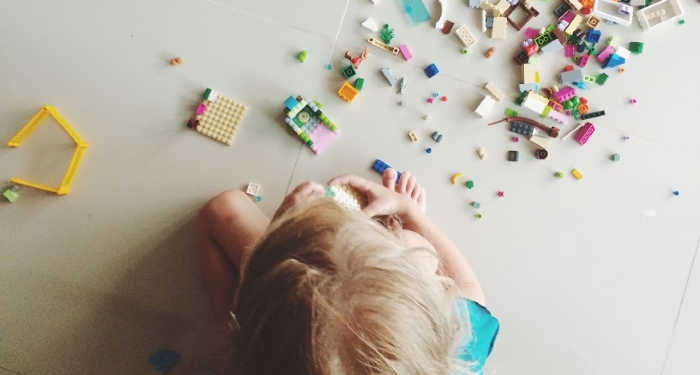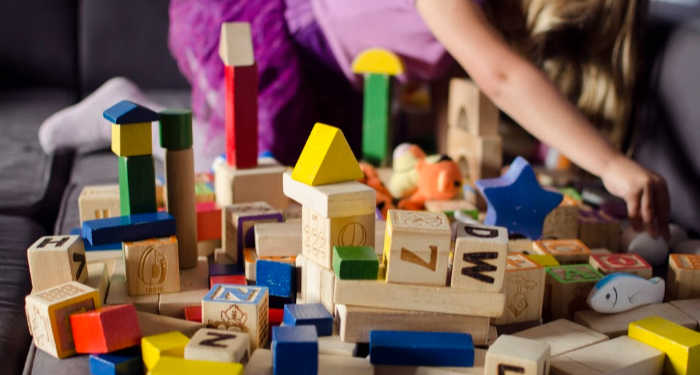Inside: Learn simple tools to help your perfectionist child learn to try again without nagging or fighting. Many approaches to helping a child with perfectionism don’t work, but THIS does. Post may contain affiliate links which means if you make a purchase I may receive a small commission at no extra cost to you.
It started when he was 2 years old and the train would slip slightly off the tracks. This would immediately send him into wails and sobs. Total devastation.
Then it was the marble tracks not aligning exactly, the LEGO set that wouldn’t build perfectly and the board game he couldn’t win the first time he played it.

It showed up at the playground when he couldn’t swing and pump on his own, the scooter he fell off countless times and the basketball that never quite made it in the hoop.
And of course, it showed up in school too when he couldn’t read the word at first glance and needed to sound it out.
Related: How to help a child focus in the classroom
Dealing with the perfectionist child.
When you see perfectionism in kids, your first instinct might be one of two things:
1.) To encourage them to keep trying or…
2.) To fix their upset and make it go away.
As a parent, you may think, he’ll gain the skills he needs to complete any given task just right, if only he gave it a few more tries.
Or you may think that your child’s upset is really inconsequential compared to the bigger problems of the world. It is only a LEGO set after all.
To help your perfectionist child, you start to say things like…
“Stop crying. Take a deep breath. Let’s work through this together.”
“It’s no big deal. Here. Look. I’ll fix it for you.”
“Relax! If you stop worrying and crying so much, you’d be able to think and figure it out.”
“There’s nothing to worry about. You’ll get it eventually.”
“Just keep trying. You’ll get it.”
All of this, of course, backfires.
To a perfectionist child, these experiences of getting it right “perfectly” can feel like life or death. Getting the LEGO set build perfect is all or nothing. It’s either perfect or it’s ruined. This is a very, very big moment to a child dealing with perfectionism.
Being able to do the monkey bars or write each letter perfectly or win the board game – it’s everything to a perfectionist.
So when you say to a child, “This is no big deal,” “don’t worry” or “just try again,” it can start to break trust. It’s at this exact moment that the child believes that you do. not. get. it.
Related: Best Customizable School Night Routine for Kids

It gets worse.
If the child believes that you really don’t get how important (or devastating) this is to them, then the child will have no choice but to escalate their communication and prove to you how important “perfect” really is to them.
This is when you’ll start to see perfectionism start to escalate.
First it was the train tracks and wailing over one train derailed. Now, it’s falling into sobs over every little thing that isn’t “just right.”
And as a parent, you’re confused.
Everything in your gut tells you to help the child calm down and stop crying, to help them fix it or to help encourage them to just try again.
So, what exactly do you say then?
How to help a perfectionist child.
All of this comes from Language of Listening® – the three part framework I use and teach to parents.
To best help a perfectionist child, the first and most important thing you can do is to take the child at his or her word. This immediately builds connection and trust, and from there, the child can open up to your guidance.
It might sound something like this…
“This is really hard for you!”
“You want it to be exact!”
“That’s not the way you wanted it!”
“You want to be able to get it the first time!”
“You love winning. Losing is awful!”
“Winning is very important you!”
“You want everything in a very specific spot or way!”
The child may come back and say something like, “Yeah, everything is ruined!” Anytime you get agreement or a head nod from a child, you’ll know that you’re well on your way to building connection and gaining trust.
This is so important!
Now you have something to work with, and you can come back with something like, “To you, it’s ruined! There must be something you CAN DO!”
Some really helpful phrases to add in here would be something like these:
“Show me the part that’s just not working for you.”
“I can help. Show me what I can do.”
“When you’re ready, you can try again. I’m here if you need a hug.”
“You can take a break if you want.”
This helps keep the child in the lead and problem-solving through the challenges they set up for themselves. Kids set up all sorts of challenges for themselves.
You can see that, right?
The challenges are made up by kids so they can build life skills.
When we step in too soon, as parents, kids never get the chance to work through it on their own, and it continues to show up over and over again.
It’s the big reason why helping the child problem-solve through their own perfectionism is so crucial. Problem-solving teaches kids how to handle their own perfectionism now and into adulthood even when no one else is there to offer guidance.

There’s one more part.
Once you’ve connected with your perfectionist child and offered some alternatives the child CAN DO instead, this is usually a great time to go into STRENGTHs.
This is where you help your child see their inner greatness. And here’s the best part, when you name a STRENGTH for a child, their future actions are based out of it.
The child can see it in themselves.
When your praise is tied to observation and you say, “Look, this was really hard for you. And you took a break, tried again and finished it exactly how you wanted – that shows problem-solving and determination.”
Here’s some other examples of naming a STRENGTH for a perfectionist child:
“You did it! You wanted it perfect right away. It wasn’t. So you took a break and told me how I could help you. Then you came back and finished it exactly how you wanted. That’s perseverance.”
“You handled that! You wanted to have a good cry. Then you calmed yourself down and came back and fixed it yourself. That’s thinking things through!”
This is when perfectionist kids can really start to see a path toward getting what they want.
Going through this process of taking kids at their word and helping them problem-solve is how you can have really effective guidance as a parent.
Starting right off with encouragement or trying to fix it will fall on deaf ears. It falls flat.
Building the LEGO set perfectly the first time isn’t all that big of a deal to a grown up, but to a perfectionist child, it’s feels impossible.
When you take the time to listen and step into the child’s world, help them problem-solve, and then help them see their inner greatness with STRENGTHs, I promise, your child can start to see that…anything is possible.
Print this free listening checklist.
This post comes with a free printable checklist to help with listening. I always have the hardest time remembering these phrases. This printable simplifies it!
Here is a sneak preview…
Download Your Free Printable
- Download the checklist. You’ll get the printable, plus join 37,000+ parents who receive my weekly parenting tips and ideas!
- Print. Any paper will do the trick, but card stock
would be ideal.
- Place it on your refrigerator. Check things off as you go and don’t forget a thing!
Want more on parenting?
- The Big Reason Why Setting Limits With Your Strong-Willed Child Isn’t Working
- Dealing With a Controlling Child? The “Secret Sauce” to Gaining Cooperation
- How to Tame Your Child’s Temper Tantrum With Two Simple Words
- The Ultimate Guide: How to Create a Summer Schedule for Kids
I've created a free email series just for you! If you are struggling with teaching your child to listen, this series will help transform your parenting. Yes, really. I've seen my proven strategies work time and time again for parents. I know it can work for you too.
After taking my free email series, you will:
- Learn simple, yet highly effective listening strategies
- Experience a stronger connection with your child
- Enjoy more peaceful parenting days
- Gain more cooperation from your child














Such a great post. I am a school psychologist, always learning, and i have learned from you, especially the problem solving part. The first part, importance of validation is well known to me, but the second step was very helpful. I have a perfectionist child whom i dont seem to help enough, with all my knowledge and experience